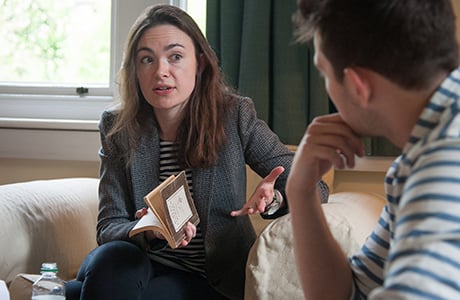
History and English
Course overview
UCAS code: VQ13
Entrance requirements: AAA
Course duration: 3 years (BA)
Subject requirements
Required subjects: English Literature or English Language and Literature
Recommended subjects: History
Helpful subjects: Not applicable
Other course requirements
Admissions test: None in 2025
Written Work: Two pieces
Admissions statistics*
Interviewed: 52%
Successful: 14%
Intake: 15
Successful for a different course: 7%
Applicant intake for a different course: 9
*3-year average 2022-24
History contact
Tel: +44 (0) 1865 615000
Email: [email protected]
English contact
Tel: +44 (0) 1865 271055
Email: [email protected]
Unistats information for this course can be found at the bottom of the page
Please note that there may be no data available if the number of course participants is very small.
About the course
A joint degree in History and English requires students to think critically about how we define ‘history’ and ‘literature’, and about how the two disciplines interrelate and, to a large extent, overlap.
Close attention is given to changing methodologies, to the nature of evidence and to styles of argument. It is assumed that historical documents are just as much ‘texts’ as poems, plays or novels, and are therefore as subject to interpretation as works of narrative, rhetoric and, fundamentally, language.
In turn, it is assumed that poems, plays and novels represent historically-grounded ways of interpreting a culture.
Interdisciplinary study has become a thriving area in its own right as scholars have moved away from what would once have been thought of as ‘purely’ historical or literary criticism to a more comparative way of thinking about the written records of the past (including, of course, the very recent past).
The History and English Faculties are among the largest in Britain, with long and distinguished traditions of teaching and research. Students are offered a great deal of choice in the course over their three years, and whether their interests are in the medieval period, the Renaissance, or the later periods, intellectually fruitful combinations are always possible.
The course structure at Oxford is intended to enable students to relate literary and historical ideas as effectively as possible in the investigation of their chosen historical periods, topics or authors. The structure recognises that some students will wish to opt for variety rather than close congruity between their historical and literary papers.
An interdisciplinary approach is embedded in each year of the course, with:
- dedicated classes in the first year as part of the Introduction to English Language and Literature paper
- a bridge paper taken in the second year (examined by extended essay)
- and an interdisciplinary dissertation in the final year.
All interdisciplinary elements of this course are co-taught or co-supervised by a historian and a literary scholar.
Oxford possesses exceptional library provision for both subjects in the Bodleian Library, the History Faculty and English Faculty libraries, other faculty libraries and the college libraries.
 |  | |
'I love reading all sorts of texts from novels to biographies and wanted a subject that would allow me the greatest breadth to continue to do this. I also firmly believe that no study of literature is complete without understanding the context behind each author and their work – something I have ample opportunity to explore in my degree. I was also attracted to the variety of modules on offer across the two disciplines and in my first year have studied options as diverse as Modernist literature and Early Modern Witchcraft...There is consistent opportunity for you to explore the crossover between the two subjects, be it in your interdisciplinary module, or in your tutorial essays. You can explore big questions such as: how literary are historical documents? Is the past a narrative we can read like a literary text? Or it's equally possible to keep your two subjects more separate if you prefer.' Holly | 'My degree allows me, above all, to keep studying both the subjects I love, but also to tie them together in interesting ways: by looking at the development of literature during the periods of history I study, as well as by taking bridge papers which are specifically designed to bring the two subjects together. I’m really glad I took the challenge of applying for a joint honours course, as having the opportunity to be taught by experts in both fields is so rewarding. I’d tell people who love two different subjects that not only do you NOT have to choose between them, but also studying them jointly allows you to get even more from your degree.' Josie |
Unistats information
Discover Uni course data provides applicants with Unistats statistics about undergraduate life at Oxford for a particular undergraduate course.
Please select 'see course data' to view the full Unistats data for History and English.
Please note that there may be no data available if the number of course participants is very small.
Visit the Studying at Oxford section of this page for a more general insight into what studying here is likely to be like.
History and English
A typical week
You will have up to two tutorials a week and will often, but not always, be working on two papers simultaneously. Most students attend three to four lectures a week. In the first and second years, you will also attend interdisciplinary classes with both English and History tutors present, in preparation for the bridge paper. For the final-year dissertation you will be allocated an adviser from each discipline.
Tutorials are usually 2-4 students and a tutor. Class sizes may vary depending on the options you choose. There would usually be no more than around 12 students.
Most tutorials, classes, and lectures are delivered by staff who are tutors in their subject. Many are world-leading experts with years of experience in teaching and research. Some teaching may also be delivered by postgraduate students who are usually studying at doctoral level.
To find out more about how our teaching year is structured, visit our Academic Year page.
Course structure
Year 1
Courses | Assessment |
|---|---|
Four courses are taken:
| Three timed written exams form the first University examination, together with a submitted portfolio of two exam essays of 2,000 words for Introduction to English language and literature. All exams must be passed, but marks do not count towards the final degree. |
Years 2 and 3
Courses | Assessment |
|---|---|
Seven courses are taken:
| Final University examinations: between three and five timed written exams will be examined at the end of the third year; plus a combination of one or two extended essays; one bridge essay; one interdisciplinary dissertation. |
Visit the History website and the English website for the latest information on all course details and options.
The content and format of this course may change in some circumstances. Read further information about potential course changes.
Academic requirements
Qualification | Requirements |
|---|---|
A-levels: | AAA |
Advanced Highers: | AA/AAB |
International Baccalaureate (IB): | 38 (including core points) with 666 at HL |
Any other equivalent qualification: | View information on other UK qualifications, and international qualifications. |
Wherever possible, your grades are considered in the context in which they have been achieved.
Read further information on how we use contextual data.
Subject requirements
Essential: | Candidates are expected to have English Literature, or English Language and Literature, to A-level, Advanced Higher, Higher Level in the IB or any other equivalent. |
|---|---|
Recommended: | It is also highly recommended for candidates to have History to A-level, Advanced Higher, Higher Level in the IB or another equivalent. |
If a practical component forms part of any of your science A‐levels used to meet your offer, we expect you to pass it.
If English is not your first language you may also need to meet our English language requirements.
Astrophoria Foundation Year
If your personal or educational circumstances have meant you are unlikely to achieve the grades listed above for undergraduate study, but you still have a strong interest in the subject, then applying for History and English with a Foundation Year might be right for you.
Visit the Foundation Year course pages for more details of academic requirements and eligibility.
Applying
All candidates must follow the application procedure as shown on our Applying to Oxford pages.
The following information gives specific details for students applying for this course.
Admissions test
You do not need to take a written test as part of an application for this course in 2025.
Written work
Description: | Candidates will be required to submit one piece of written work for History and one piece for English. Please refer to the English Language and Literature and History course pages for guidance on written work requirements. |
|---|---|
Deadline: | 10 November 2025 |
Visit our further guidance on the submission of written work for more information, and to download a cover sheet.
What are tutors looking for?
Tutors are looking for intellectual curiosity, as well as a flexible approach to engaging with unfamiliar concepts or arguments and an enthusiasm for writing and talking about history, literature and language.
Shortlisted candidates will usually be given at least two interviews, one with the History tutor(s) in the college, and one with the English tutor(s). In the English interview, the candidate may be asked to discuss a piece of prose or verse, provided before or at the interview.
Successful candidates will read widely, and will be interested in pursuing a comparative approach to historical and literary texts.
Careers
Studying this degree provides you with the opportunity to acquire a range of skills valued by recruiters and employers, including the ability to work independently, to evaluate the significance of evidence and to present arguments clearly and persuasively.
Graduates from this course have worked in the media, legal professions, public administration, teaching and finance.
We don't want anyone who has the academic ability to get a place to study here to be held back by their financial circumstances. To meet that aim, Oxford offers one of the most generous financial support packages available for UK students and this may be supplemented by support from your college.
Fees
Please note that for full-time Home undergraduate students, current university policy is to charge fees at the level of the cap set by the government, which for 2026/27 is £9,790. For details of annual increases, please see our guidance on likely increases to fees and charges. In the 2027/28 academic year course fees for Home fee status students will rise to £10,050 (in line with the government fee cap).
Fee status | Annual Course fees |
| Home | £9,790 |
| Overseas | £43,600 |
Further details about fee status eligibility can be found on the fee status webpage.
For more information please refer to our course fees page. Fees will usually increase annually. For details, please see our guidance on likely increases to fees and charges.
Living costs
Living costs at Oxford might be less than you’d expect, as our world-class resources and college provision can help keep costs down.
Living costs for the academic year starting in 2026 are estimated to be between £1,405 and £2,105 for each month you are in Oxford. Our academic year is made up of three eight-week terms, so you would not usually need to be in Oxford for much more than six months of the year but may wish to budget over a nine-month period to ensure you also have sufficient funds during the holidays to meet essential costs. For further details please visit our living costs webpage.
Financial support
Home | A tuition fee loan is available from the UK government to cover course fees in full for Home (UK, Irish nationals and other eligible students with UK citizens' rights - see below*) students undertaking their first undergraduate degree**, so you don’t need to pay your course fees up front. In 2026 Oxford is offering one of the most generous bursary packages of any UK university to Home students with a family income of around £50,000 or less, with additional opportunities available to UK students from households with incomes of £32,500 or less. The UK government also provides living costs support to Home students from the UK and those with settled status who meet the residence requirements. *For courses starting on or after 1 August 2021, the UK government has confirmed that EU, other EEA, and Swiss Nationals will be eligible for student finance from the UK government if they have UK citizens’ rights (i.e. if they have pre-settled or settled status, or if they are an Irish citizen covered by the Common Travel Area arrangement). The support you can access from the government will depend on your residency status. |
Islands | Islands students are entitled to different support to that of students from the rest of the UK. Please refer the links below for information on the support to you available from your funding agency: |
Overseas | Please refer to the "Other Scholarships" section of our Oxford Bursaries and Scholarships page. |
**If you have studied at undergraduate level before and completed your course, you will be classed as an Equivalent or Lower Qualification student (ELQ) and won’t be eligible to receive government or Oxford funding
Additional Fees and Charges Information for History and English
There are no compulsory costs for this course beyond the fees shown above and your living costs.
Contextual information
Unistats course data from Discover Uni provides applicants with statistics about a particular undergraduate course at Oxford. For a more holistic insight into what studying here is likely to be like, please view the information below and explore our website more widely.
The Oxford tutorial
College tutorials are central to teaching at Oxford. Typically, they take place in your college and are led by your academic tutor(s) who teach as well as do their own research. Students will also receive teaching in a variety of other ways, depending on the course. This will include lectures and classes, and may include laboratory work and fieldwork. However, tutorials offer a level of personalised attention from academic experts unavailable at most universities.
During tutorials (normally lasting an hour), college subject tutors will give you and one or two tutorial partners feedback on prepared work and cover a topic in depth. The other student(s) in your tutorials will typically be doing the same course as you and covering the same topic. Such regular and rigorous academic discussion develops and facilitates learning in a way that isn’t possible through lectures alone. Tutorials also allow for close progress monitoring so tutors can quickly provide additional support if necessary.
Read more about tutorials and an Oxford education
College life
Our colleges are at the heart of Oxford’s reputation as one of the best universities in the world.
- At Oxford, everyone is a member of a college as well as their subject department(s) and the University. Students therefore have both the benefits of belonging to a large, renowned institution and to a small and friendly academic community. Each college or hall is made up of academic and support staff, and students. Colleges provide a safe, supportive environment leaving you free to focus on your studies, enjoy time with friends and make the most of the huge variety of opportunities.
- Each college has a unique character, but generally their facilities are similar. Each one, large or small, will have the following essential facilities:
- Porters’ lodge (a staffed entrance and reception)
- Dining hall
- Lending library (often open 24/7 in term time)
- Student accommodation
- Tutors’ teaching rooms
- Chapel and/or music rooms
- Laundry
- Green spaces
- Common room (known as the JCR).
- All first-year students are offered college accommodation either on the main site of their college or in a nearby college annexe. This means that your neighbours will also be ‘freshers’ and new to life at Oxford. This accommodation is guaranteed, so you don’t need to worry about finding somewhere to live after accepting a place here, all of this is organised for you before you arrive.
- All colleges offer at least one further year of accommodation and some offer it for the entire duration of your degree. You may choose to take up the option to live in your college for the whole of your time at Oxford, or you might decide to arrange your own accommodation after your first year – perhaps because you want to live with friends from other colleges.
- While college academic tutors primarily support your academic development, you can also ask their advice on other things. Lots of other college staff including welfare officers help students settle in and are available to offer guidance on practical or health matters. Current students also actively support students in earlier years, sometimes as part of a college ‘family’ or as peer supporters trained by the University’s Counselling Service.
Connect with us
Outreach programmes and events
Many academic departments and faculties at Oxford have dedicated outreach events and activities aimed at promoting their subject area(s) and supporting talented students from all backgrounds to apply to their courses.
University-wide events and resources
In addition to exploring department-run activities, we recommend checking out the outreach event calendar for upcoming University-wide events and other subject and college activities.
Subject-specific resources supporting supercurricular engagement for all ages can also be found via the University's Digital Resource Hub, suggested subject resources webpage and Oxplore, our online learning platform for 11-to-18-year-olds.
UK state school students interested in this or similar courses may like to explore UNIQ, Oxford's free flagship outreach programme for students in their first year of further education. UNIQ offers a choice of academic residentials in over 30 courses and each year provides around 1,500 students with the opportunity to experience Oxford's teaching, explore student life and receive expert support with their application to university.
Prospective applicants can sign up to receive step-by-step support with their Oxford application.
Read more about Oxford's widening access initiatives and other ways to connect with us before applying.

